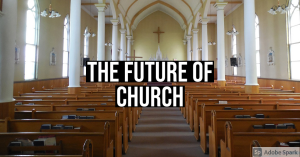Report: Religious Attendance In US Drops Below 50% For First Time
There has been talk for years about the decline of religion in the US, with all being affected but Christianity the strongest due to her generally large presence, and the rise of secularism of sorts in its place. There has been a lot of discussion about the decline of the Catholic Church in the US, which has shown the largest decline of all religious group, but this is also because the Church is the largest single bloc of Christians. The Protestants are in the same awful shape, and most likely even worse, because unlike the Church, they cannot survive either the decline in numbers or the loss in finances. The Church will suffer, but survive, while many sects may disappear entirely save for the dust pages of a history book. This includes mainline as well as ‘evangelical’ type Protestants.
According to a study that was reported on by CBS news, membership in all religious organizations has declined to the point that it is under 50% for Americans as a whole, and more importantly, remains at about 36% for Millennials and Gen Z.
Americans’ membership in houses of worship continued to decline last year, dropping below 50% for the first time in Gallup’s eight-decade trend. In 2020, 47% of Americans said they belonged to a church, synagogue or mosque, down from 50% in 2018 and 70% in 1999.
U.S. church membership was 73% when Gallup first measured it in 1937 and remained near 70% for the next six decades, before beginning a steady decline around the turn of the 21st century.
As many Americans celebrate Easter and Passover this week, Gallup updates a 2019 analysis that examined the decline in church membership over the past 20 years.
Gallup asks Americans a battery of questions on their religious attitudes and practices twice each year. The following analysis of declines in church membership relies on three-year aggregates from 1998-2000 (when church membership averaged 69%), 2008-2010 (62%), and 2018-2020 (49%). The aggregates allow for reliable estimates by subgroup, with each three-year period consisting of data from more than 6,000 U.S. adults.
Decline in Membership Tied to Increase in Lack of Religious Affiliation
The decline in church membership is primarily a function of the increasing number of Americans who express no religious preference. Over the past two decades, the percentage of Americans who do not identify with any religion has grown from 8% in 1998-2000 to 13% in 2008-2010 and 21% over the past three years.As would be expected, Americans without a religious preference are highly unlikely to belong to a church, synagogue or mosque, although a small proportion — 4% in the 2018-2020 data — say they do. That figure is down from 10% between 1998 and 2000.
Given the nearly perfect alignment between not having a religious preference and not belonging to a church, the 13-percentage-point increase in no religious affiliation since 1998-2000 appears to account for more than half of the 20-point decline in church membership over the same time.
Most of the rest of the drop can be attributed to a decline in formal church membership among Americans who do have a religious preference. Between 1998 and 2000, an average of 73% of religious Americans belonged to a church, synagogue or mosque. Over the past three years, the average has fallen to 60%.
Church membership is strongly correlated with age, as 66% of traditionalists — U.S. adults born before 1946 — belong to a church, compared with 58% of baby boomers, 50% of those in Generation X and 36% of millennials. The limited data Gallup has on church membership among the portion of Generation Z that has reached adulthood are so far showing church membership rates similar to those for millennials. (source)
An important part to point out is that this includes all religions, not just Christians. It is arguable then that the rates of Church attendance for Christians among the Millenials may be closer to or below thirty percent. Likewise, it is important to note these rates are for people under the age of forty, which is the demographic that matters the most because they are able to most likely have families.
This does not bode well for the future. It is likely that Christian attendance numbers will become lower as more people leave, and given the tendencies in the country, it may become a hated thing at some point. To be a Christian will be a thing that is not something to brag about, but done by choice and in silence, lest one find oneself in the wrath of those in power.






Comments are closed.